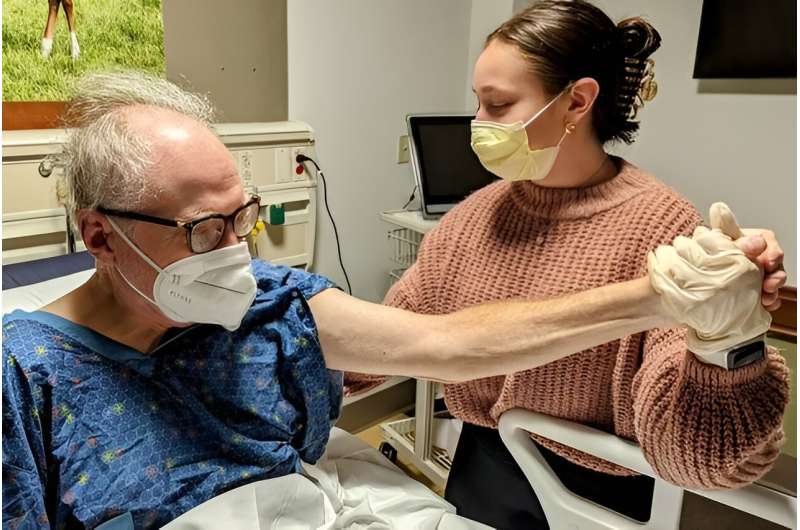This article has been reviewed according to Science X's editorial process and policies. Editors have highlighted the following attributes while ensuring the content's credibility:
fact-checked
trusted source
proofread
How simulation-based learning prepares dietetics students for clinical success

The University of Kentucky Department of Dietetics and Human Nutrition (DHN) has made significant strides in preparing its dietetics students for real-world clinical settings through an innovative program incorporating Simulation-Based Learning Experiences (SBLEs).
A recent study
by DHN faculty, published in Educational Sciences, highlights the positive impact of these simulations on students' self-perceived confidence and readiness to perform as entry-level registered dietitian nutritionists (RD/RDN). The study, "Increased Perceived Confidence in Professional Role Skills among Undergraduate Dietetic Students Following Simulation-Based Learning Experiences," assessed the self-perceived clinical and communication confidence among dietetics students who completed a series of four SBLEs over nine months. These simulations, conducted in the UK Healthcare Simulation Center, were designed to mimic real-world clinical scenarios, offering students a comprehensive understanding of diverse patients and health conditions. "Every cohort of our dietetic students goes through medical nutrition therapy (MNT) classes in their junior and senior years," said Makenzie Barr-Porter, Ph.D., DHN assistant professor and lead researcher of the study. "As part of their clinical experience, they participate in SBLEs at an affiliated hospital's simulation center, working with patient actors to simulate the role of an RDN in a hospital setting." Aaron Schwartz, DHN director of undergraduate studies and MNT instructor, has spearheaded the implementation of these SBLEs into the MNT courses since 2018. "As an educator, I have found that few things are more effective than the hands-on, high-fidelity experiences that simulations provide for our dietetic undergraduate seniors," Schwartz said. "In our MNT courses, these simulations serve as an incredible tool to prepare students for their dietetic internships and eventual entry-level RDN." The SBLEs, similar to MNT courses, are structured to increase in complexity over time. The first three simulations are group-based, in which students take turns performing various tasks such as providing
"Over the course of two semesters, students apply what they've learned in the classroom to these simulated experiences, and their growth during this period is exponential," Schwartz said.
Notably, student confidence across the study period increased among 30 of the 38 indicators measured, such as handling difficult conversations, adaptability, conducting nutrition-focused physical exams and critical thinking.
A student's perspective
Sydni Stasie, a DHN student, shared her experience with the SBLE program.
"The simulation experience was extremely beneficial," Stasie said. "It felt so very real and gave me an idea of what I'm going to be doing in the future. It also prepared me for my upcoming dietetic internship, and I am more prepared for my future as an RDN."
Stasie described the increasing progression of the simulations.
"We started out in groups to see a patient with a more common health condition, such as obesity. Then, we had a more complicated simulation involving liver disease and fluid accumulation, discussing nutritional needs for conditions like liver cancer. The third group simulation involved counseling an individual with celiac disease on a gluten-free diet, and the last, most nerve-wracking one was by ourselves, counseling a person with cancer on their nutritional care."
Why SBLEs are gaining traction in dietetics
"This is a unique aspect of our program, as not all dietetics programs have the capability to offer such comprehensive simulation experiences," Barr-Porter said.
While SBLEs are common in nursing and medical education, their use in dietetics is growing. Barr-Porter noted that dietetics students traditionally gain practical experience during internship programs. However, integrating SBLEs into the undergraduate curriculum provides students with hands-on experience before their internships, enhancing their competence and making them more effective in their roles.
"One reason for the recent adoption of SBLEs in dietetics is the growing recognition of their benefits," Barr-Porter said. "These simulations provide a safe environment for students to practice and learn from their mistakes without any real-world consequences."
The Martin-Gatton College of Agriculture, Food and Environment dietetics program is one of the few in the country with access to a comprehensive simulation center. This access has allowed the program to offer these valuable learning experiences, setting their students up for success in their future careers.
"Our findings suggest that SBLEs and our dietetics coursework are crucial in increasing students' confidence and perceived ability to perform entry-level dietitian tasks," Barr-Porter said. "As we move forward, we aim to continue refining our program and exploring new ways to enhance our students' learning experiences."
More information: Makenzie Barr-Porter et al, Increased Perceived Confidence in Professional Role Skills among Undergraduate Dietetic Students Following Simulation-Based Learning Experiences, Education Sciences (2024). DOI: 10.3390/educsci14050451
Provided by University of Kentucky





















